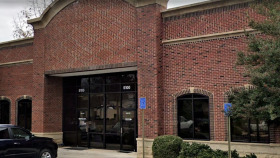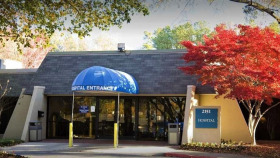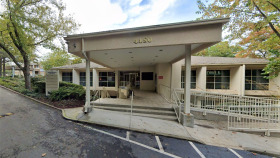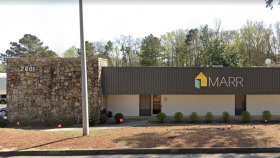Alcohol and Drug Use Statistics in Alpharetta, GA
While opioids are not the only substance abused in Fulton County or Alpharetta, they are the most prevalent.
Let’s take a closer look at how opioids have impacted Fulton County as a whole:2
In 2020, Fulton County also had an average rate of 49.6 emergency department visits involving opioid overdoses per every 100,000 people.
Levels of Drug and Alcohol Rehab
Drug and alcohol rehab settings vary in intensiveness and structure. Here’s more about the levels of care:
Detox
When you receive drug detox, a team of doctors and nurses monitor your withdrawal symptoms while the drug or alcohol leaves your body, ensuring your safety and comfort. This usually occurs first before starting formal addiction treatment services.
Residential or Inpatient
You reside at the treatment center for 30 days, 60 days, or 90 days, while receiving a myriad of treatment modalities, such as individual therapy, group counseling, family therapy, support groups, experiential therapies, and addiction treatment medications.
Partial Hospitalization Programs (PHPs)
A step down from inpatient rehab, you live at home while attending between 20 and 30 hours of counseling per week.
Intensive Outpatient Programs (IOPs)
Less intensive than a PHP, IOPs involve living at home while attending between nine and 20 hours of therapy per week.
Standard Outpatient
Standard outpatient involves just a few hours of therapy per week and may not be the best option for someone who doesn’t have a strong support system or who is struggling with a severe addiction. It may be better used as a step-down option after completing an inpatient or PHP.
Aftercare
Once you complete your addiction treatment program, you’ll want to make sure to continue receiving ongoing support to prevent relapse. This can look like joining AA, NA, or SMART Recovery, or attending ongoing therapy. Some people transition into sober living homes before returning home.
How to Pay for Drug Rehab in Alpharetta, Georgia
There are many ways to finance your addiction treatment to reduce the financial burden.
Private Insurance
Health insurance providers are required to cover substance abuse treatment and mental health services to the extent that they do surgical and medical benefits. If you have private insurance, you can likely get partial or full coverage for drug rehab. Contact your provider for more details.
Georgia Medicaid: Peach State Health Plan
Georgia’s Medicaid, or Peach State Health Plan, provides health insurance coverage for low-income Georgia residents. Medicaid covers drug and alcohol rehab, although you will need to find a rehab that accepts Medicaid.
Medicare
Georgia Medicare covers Georgia residents aged 65 and older as well as those with certain medical conditions and disabilities. It covers addiction treatment services, like medication-assisted treatment, outpatient rehab, and inpatient hospitalization. Like Medicaid, you’ll need to find a drug rehab that accepts this form of payment.
TRICARE in Georgia
TRICARE in Georgia provides health insurance coverage for veterans, active-duty military personnel, and their families. Many drug and alcohol rehabs accept TRICARE.
Sliding Scale Rehabs
A sliding scale rehab only charges you what you can reasonably pay based on your income and financial situation, greatly reducing the cost of treatment and increasing access.
IHS-Funded Drug Rehabs
The Indian Health Services funds addiction treatment programs that provide free care to Indigenous people. Most of these IHS-funded rehabs are on reservations, although a few are elsewhere.
It is Easy to Travel to and Within Alpharetta, GA?
 Whether you’re traveling to attend a drug or alcohol rehab in Alpharetta or visiting a loved one receiving inpatient care there, it’s important to know how to get around.
Whether you’re traveling to attend a drug or alcohol rehab in Alpharetta or visiting a loved one receiving inpatient care there, it’s important to know how to get around.
Here are some travel tips for your travels and stay in Alpharetta:
- The closest major airport to Alpharetta is the Hartsfield-Jackson Atlanta International Airport, which is 35 miles away. The Athens-Ben Epps Airport is a domestic airport that’s 65 miles away.
- Regarding public transportation, Alpharetta is served by MARTA—a unique rapid rail bus and transit system. There are also plenty of rideshare options, including Uber and Lyft, as well as car rental services.
- Alpharetta is an incredibly walkable city, especially in the downtown area. Most activities and errands can be done on foot, except on the outskirts of the city.
- The number of hotels in and around Alpharetta is limitless. There’s something out there for every budget, including Airbnb.
- From exploring the 9-mile-long paved bike path of the Big Creek Greenway to relaxing in Webb Bridge Park, there’s plenty to do in Alpharetta. It’s also just 22 miles from Atlanta, which is perfect for a day trip.
Georgia Drug and Alcohol Laws
Here are some relevant drug and alcohol-related laws in Georgia:1
The Mental Health Parity and Addiction Equity Act of 2008: This law requires insurance providers to cover drug rehab to the same extent they cover other medical treatments, increasing access to addiction treatment.
Georgia Naloxone Access Law: In Georgia, you can receive a prescription for naloxone (Narcan) if you know someone who is at risk of an overdose. If you are at risk of an opioid overdose, you can also receive naloxone from a pharmacist without a prescription.
The Georgia 911 Medical Amnesty Law: This Georgia overdose law provides limited legal immunity to those who call 911 to seek help for someone experiencing an overdose, meaning they won’t get prosecuted for drug possession.
Resources
- Dixon, Krystal. (2018, July 6). Fulton County Ranks Third in Opioid Cases. https://patch.com/georgia/johnscreek/fulton-county-ranks-third-opioid-cases-gbi.
- Georgia Department of Public Health. (2020). Opioid Overdose Annual Surveillance: County Reports. https://dph.georgia.gov/opioid-overdose-annual-surveillance.






















